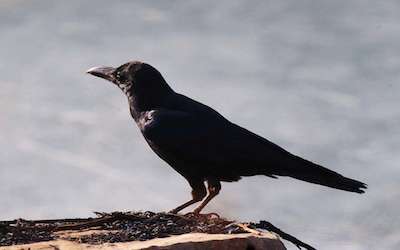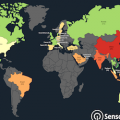PTE考生目前最大的问题之一就是练习题缺乏。除了有限的基本官方书(PLUS,Testbuilder, OG)之外
就没有题了。很多英语基础不是很扎实的同学很难找到练习材料。悉尼文波雅思PTE培训学校专门为澳洲,尤其是悉尼、墨尔本的PTE考生准备了适合PTE听力阅读练习的科学60秒。各位PTE同学可以练习PTE听力中的summarise spoken text和PTE口语中的retell lecture,PTE听力口语-科学60秒-Frosty Moss练习记笔记技巧和复述。废话少说,下面开始:
听力内容:
60秒科学节目(SSS)是科学美国人网站的一套广播栏目,英文名称:Scientific American – 60 Second Science,节目内容以科学报道为主,节目仅一分钟的时间,主要对当今的科学技术新发展作以简明、通俗的介绍,对于科学的发展如何影响人们的生活环境、健康状况及科学技术,提供了大量简明易懂的阐释。
This is Scientific American — 60-Second Science. I’m Christopher Intagliata.
The old expression “bird brain,” referring to a small or inadequate brain size—it’s not all that accurate. Take crows, for example, and other corvids, like jays and magpies. “Many corvids have relatively large brains for their body size, and can do amazing things.” Anders Møller, an evolutionary biologist at the French National Science Research Council. “So this ‘bird brain’ expression is a little bit simplified.” Some birds are so intelligent that they’re informally referred to as “primates with feathers.”
But even among the smartest bird species, there’s still natural variation in brain size. Which is a big deal—when it comes to being hunted. Møller worked with a taxidermy shop in Denmark, which had data on nearly 4000 birds brought in to be stuffed since 1960. A lot of the birds were just found dead—hit a window or wire—and people picked them up. But 300 of the specimens had been hunted.
So Møller’s team then compared the brain sizes of birds that got shot to those that didn’t. They controlled for the birds’ age, sex, body size, and species. And they found that the hunted specimens’ brains were actually five percent smaller, on average, than the brains of birds that died by other means. “The surprising thing is that, if you make a similar kind of analysis of liver or heart size, there is absolutely no difference there. So this is specific to the brain.” The results are in the journal Biology Letters.
The researchers assume that individuals with larger brains had what they called “superior escape ability.” That is, they were better at not getting shot.
As game season begins, Møller has this observation for hunters: “When you are sitting at the dinner table and eating the duck that you managed to shoot, with all likelihood it’s one with a disproportionately small brain.” Most certainly food for thought.
Thanks for listening for Scientific American — 60-Second Science Science. I’m Christopher Intagliata.
墨尔本悉尼文波PTE原创首发
更多精彩请持续关注微信wenbo_tv2。





